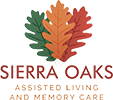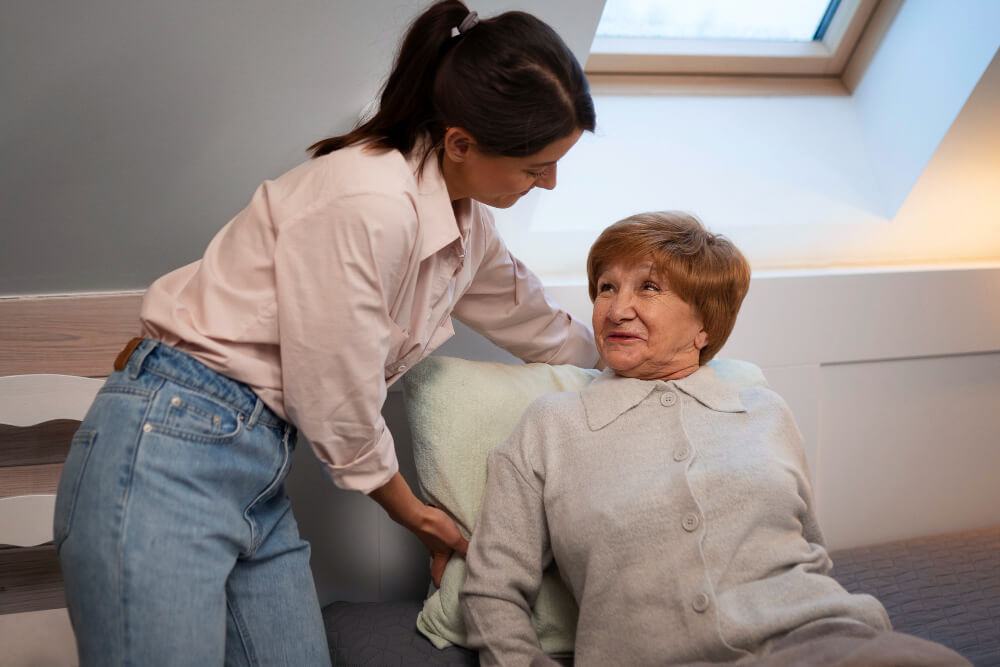As Alzheimer’s disease progresses, patients encounter falls more frequently. More than half of dementia patients experience falls annually, according to studies. These incidents may result in severe injuries such as head traumas, fractures, and loss of independence. Thankfully, there are strategies that caregivers can employ to help Alzheimer’s patients prevent falls.
Through this blog, we are going to educate you on why these falls happen and how you can keep your loved one safe.
Why People with Dementia Are at Higher Risk of Falling
Dementia can affect the brain in ways that make falls more likely. Here are some reasons:
- Trouble in Identifying Dagers: Uneven stairs, slick flooring, and other fall hazards may go unnoticed by those suffering from dementia.
- Dull Senses: A person’s ability to see, hear, or feel things may have diminished, making it more difficult for them to manage their environment.
- Confusion about their environment: They may miscalculate distances or struggle to make sense of what they see, which might cause them to trip or fall.
- Memory problems: They may fail to recall crucial details, such as your warning about a damp floor.
- Movement issues: Walking and balance might be more difficult when a person has dementia because it can make it more difficult to coordinate muscles.
How to Keep Your Loved One Safe
Create a Safe Environment
The first step towards preventing falls is creating a safe environment for Alzheimer’s patients. This means removing tripping hazards and ensuring proper lighting throughout the home. Some suggestions for enhancing safety include:
- Clear Pathways – Remove clutter, cords, and loose rugs that could cause trips or slips. Arrange furniture so it doesn’t obstruct walkways, and make sure pathways are well-lit.
- Grab Bars & Handrails – Install grab bars and handrails near stairs, toilets, and bathing areas to provide extra support when needed.
- Proper Lighting – Ensure adequate lighting both indoors and outdoors to reduce the risk of accidents during nighttime visits to the bathroom or outside walks.
- Secure Carpets – Attach carpets securely to the floor with double-sided tape or carpet grippers to prevent them from lifting up while walking.
- Non-Slip Flooring – Consider installing non-slip flooring materials, especially in wet areas like bathrooms and kitchens.
- Avoid Using Rugs – If possible, avoid using area rugs altogether, but if they cannot be eliminated, then attach them firmly to the floor with adhesive strips.
Medication Management
Many medications prescribed for Alzheimer’s patients may have side effects that contribute to dizziness, fatigue, confusion, and impaired judgment, leading to falls.
It is vital to work closely with healthcare providers to ensure medication schedules are optimal and any potential interactions between drugs are minimized or avoided entirely.
Also, medicines’ expiration dates should be checked regularly, and old prescriptions should be disposed of properly.
Regular Exercise and Physical Therapy
- Aim for 4 to 5 weekly workout sessions to maintain a consistent exercise habit.
- Explore a variety of physical exercises to discover those you enjoy the most.
- Activities such as cycling, walking, and swimming are excellent for your overall well-being.
- To stay motivated, look for group exercise classes under professional guidance at nearby gyms or community centers.
Cognitive Stimulation and Awareness Training
Alzheimer’s causes memory loss and cognitive decline, making it challenging for affected persons to remember important details about their surroundings. To mitigate these challenges, caregivers may choose to create awareness training programs specific to the patient’s needs.
For instance, posting reminders, signs, or symbols around the house to indicate where items are located, where rooms begin/end, etc., can assist in navigation without compromising privacy or dignity.
Communicate Effectively
Communication skills are critical in caring for Alzheimer’s patients, particularly those who struggle to express themselves clearly. Speaking slowly, enunciating every word, maintaining eye contact, and being attentive listeners will go a long way toward clarifying instructions and keeping everyone involved informed. Socializing for the elderly with Dementia can also be helpful.
Improve Sleep Schedule
- Limit sleep during the day to no more than 30 minutes.
- Create a nightly schedule that lets your body know when it’s time to relax.
- Before going to bed, wait at least two hours to consume coffee, drink, or smoke.
- Foods that are greasy, fried, spicy, or carbonated should be avoided since they might cause pain and heartburn.
- Get some sunshine during the day and make sure it is dark at night to maintain a healthy circadian rhythm.
Emergency Response Plan
Accidents happen despite the greatest attempts, and occasionally, individuals fall despite taking measures. As a result, having protocols in place for handling emergencies is crucial.
Test alert systems often and have a list of emergency contacts on hand. Moreover, imparting emergency response skills to family members and other close friends may prove useful in the event of unanticipated situations.
Wrapping Up
Preventing falls is crucial for protecting Alzheimer’s patients from injury. Through careful consideration of environmental hazards, medication management, and behavioral modifications, caregivers can implement effective strategies to minimize fall risks.
Additionally, utilizing fall prevention equipment and devices can further enhance safety measures. As Alzheimer’s disease progresses, ongoing monitoring and adaptation will remain critical components of successful fall prevention plans.





